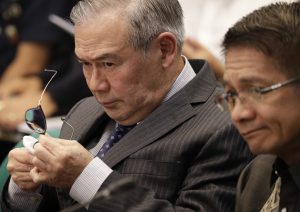The Philippine foreign secretary warned Thursday that abrogating a security accord with Washington would undermine his country’s security and foster aggression in the disputed South China Sea.
The warning came after President Rodrigo Duterte threatened last month to give notice to the United States to terminate the Visiting Forces Agreement, which allows American forces to train in the Philippines, if the reported cancellation of the visa of his political ally, Senator Ronald dela Rosa, was not corrected within a month.
“I’m warning you … if you won’t do the correction on this, I will terminate the … Visiting Forces Agreement. I’ll end that son of a bitch,” the brash-speaking Duterte said in a January 23 speech.
Dela Rosa served as Duterte’s first national police chief and enforcer of the president’s deadly anti-drugs crackdown in 2016. Thousands of mostly poor suspects have been killed under the campaign, alarming the U.S. and other Western governments and human rights watchdogs.
Dela Rosa and later Duterte have said Dela Rosa’s visa was canceled, but U.S. officials have not addressed the matter.
Foreign Secretary Teodoro Locsin Jr. used a televised Senate hearing to enumerate what he described as crucial security, trade, and economic benefits the accord provides. The United States is a longtime treaty ally, a major trading partner and the largest development aid provider to the Philippines.
“While the Philippines has the prerogative to terminate the VFA anytime, the continuance of the agreement is deemed to be more beneficial to the Philippines compared to any predicates were it to be terminated,” Locsin said.
The accord, known by its acronym VFA, took effect in 1999 to provide legal cover for the entry of American forces to the Philippines for joint training with Filipino troops.
A separate defense pact subsequently signed by the allies in 2014, the Enhanced Defense Cooperation Agreement, allowed the extended stay of U.S. forces and authorized them to build and maintain barracks and warehouses and store defense equipment and weapons inside five designated Philippine military camps.
Terminating the VFA would affect more than 300 joint trainings and other activities this year with U.S. forces “which the Philippine military and law enforcement agencies need to enhance their capabilities in countering threats to national security,” Locsin said.
The U.S. provided more than $550 million in security assistance to the Philippines from 2016 to 2019, Locsin said, adding that there may be a “chilling effect on our economic relations” if the Philippines draws down its security alliance with Washington.
American forces have provided intelligence, training, and aid that allowed the Philippines to deal with human trafficking, cyberattacks, illegal narcotics and terrorism, Locsin said, citing how U.S. military assistance helped Filipino forces quell a disastrous siege by Islamic State group-aligned militants in southern Marawi city in 2017.
U.S. military presence has also served as a deterrent to aggressive actions in the disputed South China Sea, Locsin said.
China, the Philippines, Vietnam, and three other governments have rival claims to the strategic waterway.
Duterte first threatened to abrogate the VFA in late 2016 after a U.S. aid agency put on hold funds for anti-poverty projects in the Philippines. The 74-year-old leader, who has been harshly critical of U.S. policies while often praising China and Russia, has walked back on his public threats before.
Aside from threatening to take down the VFA, Duterte has said would ban some U.S. senators from entering the Philippines. He apparently was referring to American senators who sought to ban unspecified Philippine officials from entering the United States for their role in the continued detention of Phillippines opposition Senator Leila de Lima, a vocal critic of Duterte’s deadly campaign against illegal drugs.
Duterte has publicly accused de Lima of receiving money from drug traffickers and called for her detention. De Lima has dismissed the allegations as fabricated charges designed to muzzle dissent under Duterte.
Duterte has also barred his Cabinet officials from traveling to the U.S. and turned down an invitation by President Donald Trump to join a special meeting the U.S. leader will host for leaders of the Association of Southeast Asian Nations in March in Las Vegas, according to presidential spokesman Salvador Panelo.
Jim Gomez for The Associated Press.

































